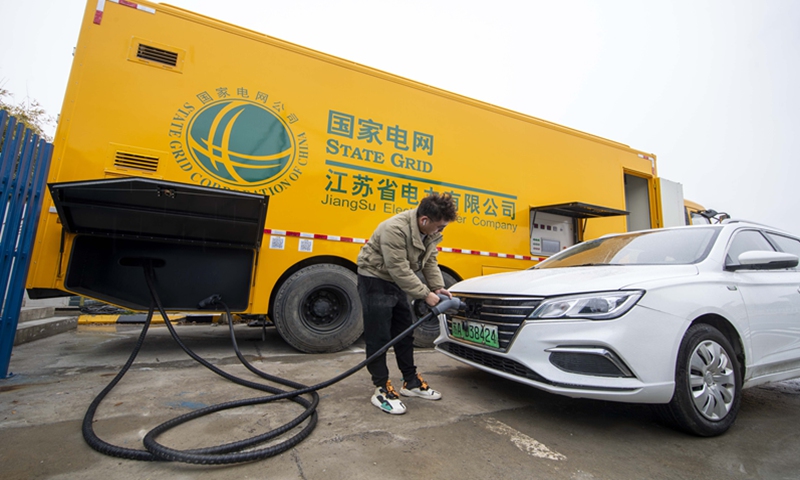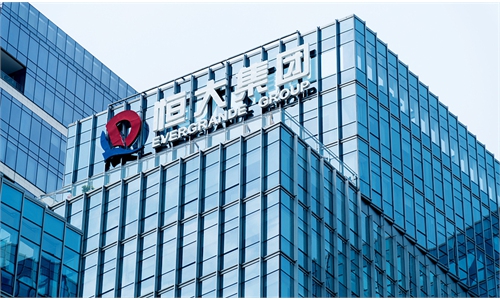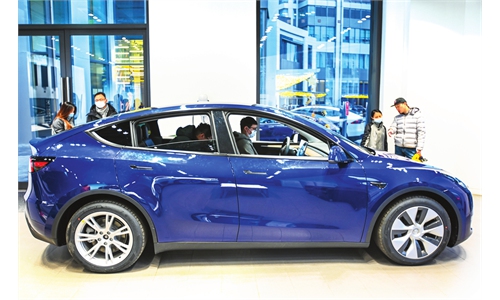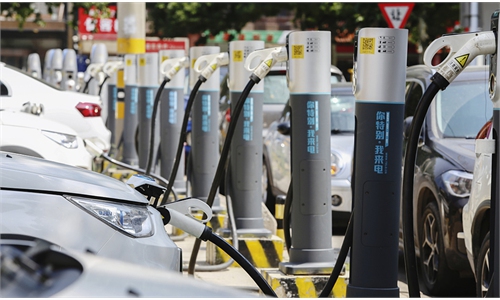
A staffer charges an electric vehicle (EV) using a mobile charging pile at the Guangling service area on the Beijing-Shanghai Expressway in Taizhou, East China's Jiangsu Province, on January 26, 2022. The mobile charging pile - a special vehicle - has four 30-kilowatt charging piles, which can serve four EVs simultaneously. It takes one hour to recharge an EV. Photo: cnsphoto
China's industry ministry has vowed to ramp up exploration of domestic resources while cracking down on hoarding and speculation, among other unfair and anti-competitive activities, as surges in the costs of raw materials used in the production of batteries for electric vehicle (EV) were in the spotlight at an industry forum in Beijing over the weekend.
The price hikes merit close attention and efforts must be made to resolve them, Vice Minister of Industry and Information Technology Xin Guobin told the forum on Saturday.
The vice minister pledged to moderately step up the exploration of domestic resources, while resolutely combating unfair and anti-competitive activities, including hoarding and speculation.
Firms across the supply chain will be urged to work together for win-win development that will push the prices of critical raw materials back to reasonable levels, Xin stated.
The range of power battery price hikes has been "beyond our imagination," said He Xiaopeng, chairman of upstart Chinese EV brand XPENG Motors, domestic financial news site eeo.com.cn reported over the weekend, citing a group interview with He on the sidelines of the forum.
A power battery is the heart of a new-energy vehicle, and its price supposedly accounts for one-third to one-half of the entire cost of a finished vehicle. As main raw materials for power battery manufacturing, lithium, cobalt and nickel have all been on a massive price uptrend.
The market price for battery-grade lithium carbonate ranged from 480,000 yuan ($75,397) to 522,000 yuan per ton on March 17, compared with a mere 50,000 yuan per ton at the start of 2021, the Economic Daily reported on March 21, citing figures from SunSirs, a major domestic provider of commodities data.
Cobalt prices have soared to 568,000 yuan per ton now from short of 300,000 yuan per ton at the beginning of 2021.
As a consequence, more than 40 EV models from nearly 20 new-energy carmakers have seen price hikes this month, according to the Economic Daily report.
A notable example was Tesla, which hiked the prices for its offerings in the Chinese market three times just this month.
The report attributed the more expensive EVs to a surge in prices that started with upstream raw materials, fed into power battery makers and then spread to carmakers.
Contemporary Amperex Technology Co, based in Ningde, East China's Fujian Province, the world's largest EV battery maker, recently revised prices for some of its products due to an upsurge in upstream raw material costs, according to Chinese news site jiemian.com.
It won't be easy to fight speculators, industry watchers said. A crackdown will be difficult, as reserves of key raw materials are mostly overseas, Cui Dongshu, secretary general of the China Passenger Car Association (CPCA), a key industry body, told the Global Times on Sunday.
"That suggests China's sweeping regulatory fight against speculation in thermal coal prices over the past year will be difficult to replicate in this case," Cui said.
The country's coal output rose by 4.7 percent year-on-year to an all-time high of 4.07 billion tons last year, official data showed, as part of efforts to curb coal prices that had weighed on the world's largest producer and consumer of coal.
Domestic mining of key raw materials for EVs has been restricted due to environmental concerns, Cui continued, noting that if policy easing is to be announced for domestic mining, the regulatory crackdown will be more effective.
Even though there might be no quick fix for exorbitant prices of lithium, cobalt and nickel, a continued surge in power battery prices is less likely in the near future, industry insiders said.
As XPENG Motors' He put it, battery supplies were very tight starting last year, as demand for new-energy vehicles and stored energy both maintained high growth.
Battery supplies will still face a substantial challenge this year, but things will get much better in the second or third quarter of next year.
In the words of Cui, the pressure on power battery costs will gradually trend downward.
Cui suggested that the country should dial down on stored energy projects for the time being, as the outpouring of investment in this sector is intensifying power battery supply shortages.
As for the EV price hikes, Cui said they reflect transient concerns over power battery supplies. Over the longer term, EV prices will fall as supply shortages fade and technology makes vehicles cheaper.



